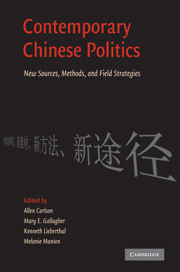Introduction
Published online by Cambridge University Press: 05 June 2012
Summary
At a workshop at the University of Michigan in November 2006, three generations of scholars met to discuss and debate the study of Chinese politics and how new and diverse sources and methods are changing the field. This volume is the culmination of that workshop. Drawing on diverse research experiences, we present a wide range of sources, methods, and field strategies for the study of Chinese politics in the new era. As political scientists, we place our distinct methodological approaches in the framework of the discipline and point to particular challenges or opportunities (or both) of adaptation in the context of contemporary China. With the main focus on methodological concerns and the discovery of new data sources, the chapters in this volume are also richly substantive illustrations that demonstrate how to adapt method to context innovatively and appropriately. Thus, this book illustrates the benefits of the emerging cross-pollination between China studies and the broader discipline.
Three major themes emerged from our workshop discussions: (1) how to effectively use new sources and data collection methods, (2) how to integrate the study of Chinese politics into the discipline of political science to the betterment of both, and (3) how to deal with logistical and ethical problems of doing research in a challenging environment. In this Introduction, we discuss these themes in the sections below in the context of the initial workshop, the substantive chapters in this volume, and the field more generally. As only sporadic attention has been paid to the nuts and bolts of the study of Chinese politics, we hope this volume will spark future debates and other publications, conferences, and graduate training on research design and methodology in challenging fieldwork sites. We recognize that this volume joins an existing ongoing debate (Baum, 2007; Harding, 1994; Heimer and Thøgersen, 2006; Manion, 1994; Perry, 2007 and 1994b; Shambaugh, 1993; Wank, 1998). Collectively the following chapters illustrate that although much has changed in the realm of studying Chinese politics, many of the fundamentals that previous scholars learned about this endeavor still apply. Language skills and familiarity with China strike us as remaining core prerequisites for scholars wishing to make sense of any given aspect of Chinese politics. Moreover, local knowledge – that is, knowing China – is increasingly insufficient. Each of the contributors to this volume has also utilized a wide variety of research skills in his or her work. These skills cover a broad set of approaches to politics and include the use of sophisticated quantitative techniques, the production and utilization of survey data, the application of new technologies, searching out and making use of previously closed archival sources, and even conducting quasi-experiments. Although such approaches cover many tools in the political science kit, and are illustrative of the impressive and at times conflicting directions in which the study of Chinese politics is headed, all contributors to this volume have made use of such methods with a common purpose in mind: to amplify their ability to describe and explain key aspects of politics in contemporary China. As such, the volume shows the rewards of bringing together scholars with diverse backgrounds, yet who share a collective commitment to pushing both China studies and the discipline forward in an inclusive and mutually beneficial manner. Thus, although the volume focuses on mainland China almost exclusively, we believe that the methodology and research design strategies presented here are relevant to scholars in many other places around the globe.
- Type
- Chapter
- Information
- Contemporary Chinese PoliticsNew Sources, Methods, and Field Strategies, pp. 1 - 12Publisher: Cambridge University PressPrint publication year: 2010
- 1
- Cited by



